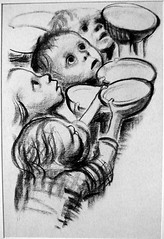Those that support the Iraq pullout concept, like Australia's opposition leader, Mr Rudd, ignore the duty of care responsible people have to the world, and their own, community.
The rhetoric of such individuals make many untrue claims regarding the past and the present.
The truth is that the war in Iraq is being fought effectively, against bitter opposition, some of which is at home. The current situation will improve, but maybe not in the current electoral cycle. The Coalition is not being bled dry, with smaller casualty figures being recorded than in some, recent, peace time situations. Abandoning the fledgeling Iraqi peoples now will not produce observable benefits at home or abroad, but will aid terrorists.
The best way to protect innocent peoples from harm is to nullify terrorist activity.

Insurgents Target Coalition, but Kill Civilians
ReplyDeleteBy Maj. Joe Sowers
3rd HBCT Public Affairs
FORWARD OPERATING BASE HAMMER, Iraq – Insurgents who target coalition and Iraqi security forces sometimes miss the mark – with grave consequences for Iraqi civilians.
Soldiers from Troop C, 3rd Squadron, 1st Cavalry Regiment, were targeted by insurgents while patrolling in Jisr Diyala, southeast of Baghdad, Aug. 21. U.S. Soldiers were unhurt, but two local children were caught in a roadside bomb explosion, killing one child and injuring another.
Capt. Darrell Melton, Troop C commander, a native of San Antonio, described the incident.
“The trail Bradley gunner was waving at two kids who were riding their bikes and were waving at my guys,” Melton said. “The next thing the Bradley commander knew, one of the kids was gone in a puff and he was thrown backward in the hatch. When he looked back, the other kid was crawling on the ground.”
Melton said his Soldiers immediately dismounted their Bradley Fighting Vehicle and cautiously approached the wounded child. It is not uncommon for improvised explosive devices to be emplaced in groups and detonated on first responders coming to provide aid.
“He (the wounded child) crawled a few feet, when the medic on site, despite the danger, ran out to him, picked him up and ran back to the Bradley to administer first aid,” Melton said.
The medic was able to stabilize the wounded child, Melton said. Troop C then evacuated the child to a U.S. Army medical facility nearby.
Such incidents are not unique to Troop C. Soldiers from Company A, 1st Battalion, 15th Infantry Regiment, came upon a grieving family in the course of a routine combat patrol, Aug. 13, in Salman Pak.
Capt. Chris Pearson, of Birmingham, Ala., met with a local banking official in Salman Pak to discuss issues and prospective solutions concerning the banking industry in the local area. After the meeting, a town councilman approached him with a father who had lost his son earlier in the day to a roadside bomb.
Pearson said he did not talk directly to the father, but the councilman explained the father just wanted to bury his son in accordance with Muslim tradition.
“I expressed the coalition’s condolences,” Pearson said. “Even though the IEDs target police or coalition forces, they can hit children and families. They are the ones that suffer.”
The councilman informed Pearson that the family was having trouble getting through checkpoints and requested U.S. Soldier assistance in traveling to the cemetery.
“Just to make it easier, we had them travel with us,” Pearson said.
After dropping off the family, Pearson’s element began movement to Combat Outpost Cahill, north of Salman Pak. While traveling to COP Cahill, Pearson’s unit received word that the grieving family had run into another IED as they were returning from the burial. No one was seriously injured in the second incident.
Pearson further explained that national police, local Iraqi police, governmental leaders and coalition forces all play a role in maintaining security in the area. When Pearson’s unit arrived in March, the local populace and Iraqi security forces had not yet developed a trusting relationship.
“There are still a lot of improvements that need to be made,” Pearson said. “Everyday it gets better. There are highs and lows. They’ve begun attending meetings together and as long as they are communicating, it’s helpful.”